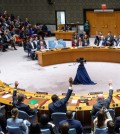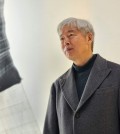- California Assembly OKs highest minimum wage in nation
- S. Korea unveils first graphic cigarette warnings
- US joins with South Korea, Japan in bid to deter North Korea
- LPGA golfer Chun In-gee finally back in action
- S. Korea won’t be top seed in final World Cup qualification round
- US men’s soccer misses 2nd straight Olympics
- US back on track in qualifying with 4-0 win over Guatemala
- High-intensity workout injuries spawn cottage industry
- CDC expands range of Zika mosquitoes into parts of Northeast
- Who knew? ‘The Walking Dead’ is helping families connect
Koreans win $2 million prize in DARPA’s robotics contest
By Brian Han
A team of South Korean robot engineers won the Defense Advanced Research Projects Agency’s (DARPA) Robotics Challenge Finals contest on Saturday yielding the coveted $2 million first place prize.
The event was held at the Los Angeles County Fairgrounds in Pomona, Calif. in front of judges, spectators and reporters, some of whom described the excitement of observing the competition similar to “watching a golf match” according to the New York Times.
Built by members representing the Korean Advanced Institute of Science and Technology (KAIST) of Jaejon, South Korea, the robot RBC-Hubo outperformed 22 others in eight different tasks derived from disaster relief scenarios.
The idea for the competition was born out of a response to Japan’s Fukushima nuclear power plant meltdown back in 2011.
The tasks included walking through uneven terrain, turning valves, driving cars and opening doors among several others.
By developing robots that could complete these tasks efficiently, government agencies hope to have a better means of traversing disaster-stricken areas that are too dangerous for human rescuers to enter.
The technology is still far off from Hollywood’s renditions a la “Iron Man” as many of the robots found themselves stumbling and falling over during parts of the obstacle course.
The ability for the teams to control their robots wirelessly displayed a marked improvement in robotics technology — one that required machines to be attached to a large tangle of wires at all times just a few years ago.
The Institute of Human and Machine Cognition from Pensacola, Fla. came in second place and received a $1 million prize.
















